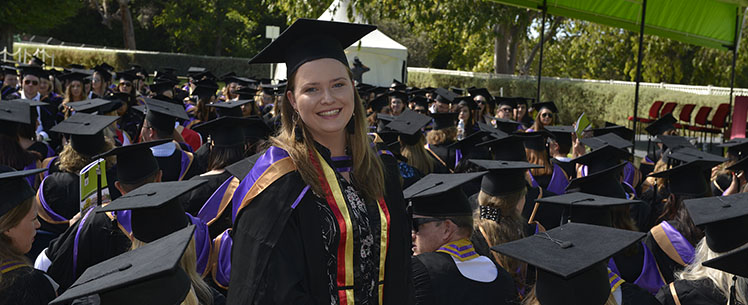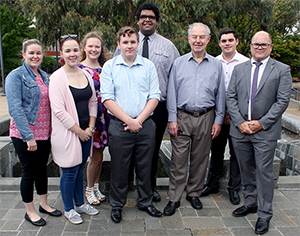A gift that keeps on giving
Educator and philanthropist Max Schroder donated $1.25 million in late 2019 to scholarship programs for Indigenous students at UNE in what is the largest financial gift from a living donor in the university’s history.

Max Schroder scholar, Sarah Thomas, on her graduation day at UNE
This generous donation will enable Max Schroder Indigenous Scholarships, Ella Schroder Indigenous Scholarships and Mentoring Scholarships for Indigenous Students to continue for many years to come, whatever the economic climate.
“It is not imagined or intended that this fund will last forever, however by investing these funds the UNE Foundation can ensure the best educational outcomes for our Indigenous students for at least another decade,” Max said.
“I am sharing this story, not for personal aggrandisement but in the hope that it may encourage others to contribute in whatever way they can.”
Since 2008, University of New England (UNE) alumnus Max Schroder has provided some 51 scholarships to support Indigenous students pursuing degrees in education, nursing, medicine and law. One of them was Sarah Thomas, who completed a Bachelor of Education. Two years on, as a successful high school teacher, she finds it difficult to quantify the powerful practical, financial and emotional impact of her scholarship.
“Max’s support was life-changing,” says Sarah, who was raised in Lightning Ridge, in far north-western NSW and barely 17 when she arrived in Armidale. “My parents had not finished high school, let alone considered university. It seemed so foreign for people like us and wouldn’t have been a reality for me without Max’s scholarship.”
It enabled Sarah to live on-campus, which eased her homesickness, and to dedicate herself to study and enjoying her wider university experience without needing to take on the challenge of part-time work. The additional benefits of enjoying college and university leadership opportunities, gym membership and the support of Indigenous mentors (to whom Max had also awarded scholarships) made Sarah feel “valued and important”.
“Max focussed on me as an individual, even paying for eye tests and glasses when I needed them,” she said. “For the four years of my degree I felt that there was someone in my corner. He believed in me.”
The bond that developed over annual lunches and regular contact with Max left a profound legacy; it instilled in Sarah a philosophy about the importance of education and an ethos that she continues to live her life by.
“Max has taught me that education is for everyone; it does not judge where you’ve come from, rather it shows you where you can go,” Sarah says. “This is the most powerful tool we can arm ourselves with. It has the ability to transform and enrich the lives of individuals and those around them, and I take it into the classroom with me every day.”
By providing scholarships for undergraduate students living in a UNE residential college, Indigenous students who went through boarding school (Ella Schroder scholarships named for his mother), or post-graduate or final-year students can act as mentors to their undergraduate peers, Max Schroder has made a personal commitment to addressing the inequality many Indigenous Australians experience.
Beyond the financial support, Max has invested in the lives and wellbeing of scholarship recipients, many of whom are the first in their family to attend university. Encouraging contact with the Oorala Aboriginal Centre and engagement with the broader Indigenous student community is almost certainly a contributor to the strong retention rates among scholarship recipients.
Max has taught me that education is for everyone; it does not judge where you've come from, rather is shows where you can go.
Perhaps his appreciation of the factors that come into play for Indigenous students can be traced back to Max’s time first teaching [he received a scholarship himself to attend Armidale Teacher’s College] position at Armidale Demonstration School in 1963. “My first class was a remedial class, which was effectively every kid they didn’t know what to do with,” Max remembers. “It was a grade 3/4/5 and about one-third to one-half of the kids were Aboriginal, from East Armidale. Many were living in shanties around the tip. When they went home there was nowhere to study, no power and they were lucky to have candles to read by. I used to give one kid my cut lunch every day because he had nothing to eat.
“It was a challenge. I had never had anything to do with Aboriginal people before. But I was well aware that many of these kids were dragging serious baggage along behind them from day one. Anything I could do to help them get over or around the challenges they faced always proved worthwhile. The rewards came from watching these kids succeed. I realised that whatever the reasons for their weak academic performance, it was not due to any lack of effort or ability. They simply lacked opportunity and direction.”
The word opportunity comes up a lot in conversation with Max, who grew up in humble rented accommodation in the working class Sydney suburb of Belmore. He earned places at a selective primary school and high school, and the scholarship to attend Armidale Teacher’s College. “I would never have gone on to tertiary education except for that,” says Max, who later completed a BA (Hons) and MA (Hons) at UNE during 13 years of part-time study.

Max Schroder, third from right, with some of the recipients of his scholarships in 2017.
The qualifications provided a platform for his career in education as a lecturer and administrator, and ultimately head of his own higher educational institution. It was the sale of his listed company NAVITAS Ltd that provided the scholarship funds “to enable me to assist others from challenged and disadvantaged backgrounds to gain the opportunities I enjoyed”.
Schroder scholarship recipients at UNE come from many different backgrounds but share a deep admiration for Max. He typically receives annual Christmas and thank you cards following their graduation. “My response is always that I am grateful they have taken the opportunity and done something with it, and that they have been successful and will go on to do more,” Max says. “The scholarship program is paying off, and I’m proud of and pleased for those who get through. It’s not easy for anybody, and when you pile on top of that Aboriginality, a disadvantaged background and the associated challenges, it’s a tough ask.”
Max’s hope that his scholars will be an exemplar for others in their families and communities is routinely realised. Sarah’s achievements were not only personally transformative. “My graduation was a turning point for my mother,” she says. “It inspired her to do a Pathways course and now she is enrolled in a Bachelor of Accident
Forensics. My family is so grateful for Max’s generosity and the positive impact he’s had on our lives.”
More than 1000 Indigenous students are currently enrolled at UNE, the majority of them female and most from regional areas. In addition:
- about one-quarter come from low SES backgrounds;
- 53% are the first in their family to take up tertiary studies; and
- 15% have indicated they have a disability.
As at August 2019:
- the number of Indigenous on-campus students increased from 156 to 199;
- the number of post-graduate coursework students increased from 107 to 129;
- the number of undergraduate students increased from 598 to 688; and
- the number of enabling students increased from 91 to 93.

